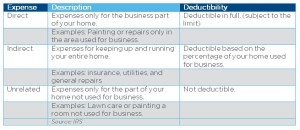What Are Miscellaneous Itemized Deductions and Are They Worth Tracking?
March 01, 2017
Editor’s note: Please note that all miscellaneous deductions were eliminated with the passing of the Tax Cuts and Jobs Act of 2018, but would still apply for tax year 2017 and prior.
Whenever I’m asked for “little known” tax tips, I can’t help but be a little annoyed. Part of the reason they are little known is because they apply to so few people, at least when it comes to deductions that fall under the “miscellaneous itemized deductions” umbrella. Things like tax preparation fees, unreimbursed business expenses and the home office deduction for employed workers – these are all deductions that I personally have in my life and yet I see no tax benefit because the only way they are actually deductible is if they exceed 2% of my adjusted gross income. In other words, a married couple who makes a combined $100,000 would only be able to deduct miscellaneous items that exceed $2,000, which is 2% of their income. That’s a lot of unreimbursed expenses.
However, I still track mine just in case. I probably won’t have a deduction in a normal year, but should something big come up or we have a year of unexpectedly low income, I want to be able to take whatever deductions are available. Here are the common deductions that may be worth tracking, even if you don’t get to write them off, as well as some expenses that people think are deductible but aren’t:
Common deductions worth tracking
Unreimbursed business expenses. Anything you pay out of your own pocket that applies directly to your job but you can’t put on your work expense report falls in this category. For example, when I travel for work, we have daily meal allowances. They’re reasonable, but sometimes I like to treat myself to a nicer dinner than the guidelines allow. I keep track of the amount I spend over the per diem limit as an unreimbursed expense.
Another example is a professional organization I belong to here in Chicago. My membership doesn’t fit my company’s expense guidelines, but it’s still work-related. I wouldn’t be a member of this group if I didn’t have my job. Other examples would be if your employer doesn’t reimburse at the full IRS-allowable mileage rate or if you subscribe to any magazines for your field. The full IRS list is here.
Tax preparation fees. Even if you do your own taxes, chances are you have to pay for the software or at least filing fees. Make a note of this expense in your tax files just in case you have other miscellaneous deductions that you can add on for a deduction.
Appraisal fees. If you made a gift to a charity that required an appraisal or if you had a casualty loss that required you to get an appraisal for insurance purposes, those are deductible in this category.
Any of these expenses. Many of the expenses that qualify may be one-time things that you didn’t know you could deduct, like repayments of Social Security benefits. It’s worth reviewing the list each year to see if you paid any of these things, in case they push you over the limit.
What’s not considered a miscellaneous deduction
Funeral expenses. If you prepaid your funeral expenses or purchased your burial lot ahead of time, those are not tax deductions, contrary to popular belief. However, once you’re gone, if you have a taxable estate, those expenses may be applicable there (something worth noting for executors of estates.)
Commissions paid to a broker. Fees for investment advice are deductible, leading many to believe that they can also deduct commissions. Instead, commissions become part of the cost basis of the investment purchased, so you’ll realize the tax benefit when the commission reduces the amount of your capital gain when the investment is sold.
Lost or misplaced cash or property. Losing something is not the same as someone stealing it or having it ruined due to a fire, flood or other event, which would make it a casualty loss (reported on Form 4684.) But just leaving your phone somewhere and not having it returned to you or dropping your wallet on the street is not deductible. There are no tax benefits for being careless…
Any of these expenses. Claiming a deduction for any of these items on your tax return could result in a tax levy from the IRS or sometimes even a full audit. While it seems like you should be able to write some of these things off, the bad news is that you can’t. C’est la vie.
I keep a file for receipts that would apply should I end up in a tax year where the total of these expenses might exceed 2% of my AGI. As I prepare to file taxes at the end of the year, I just do a quick review of the expenses that qualify to make sure I’m not forgetting anything, then recycle those receipts if they don’t add up to enough. So what do you think? Are these expenses worth tracking to you?
Kelley Long is a Resident Financial Planner with Financial Finesse, the leading provider of unbiased workplace financial wellness programs in the US. For more posts by Kelley or to sign up to have her weekly post delivered to your inbox each Wednesday, please visit the main blog page and sign up today.

